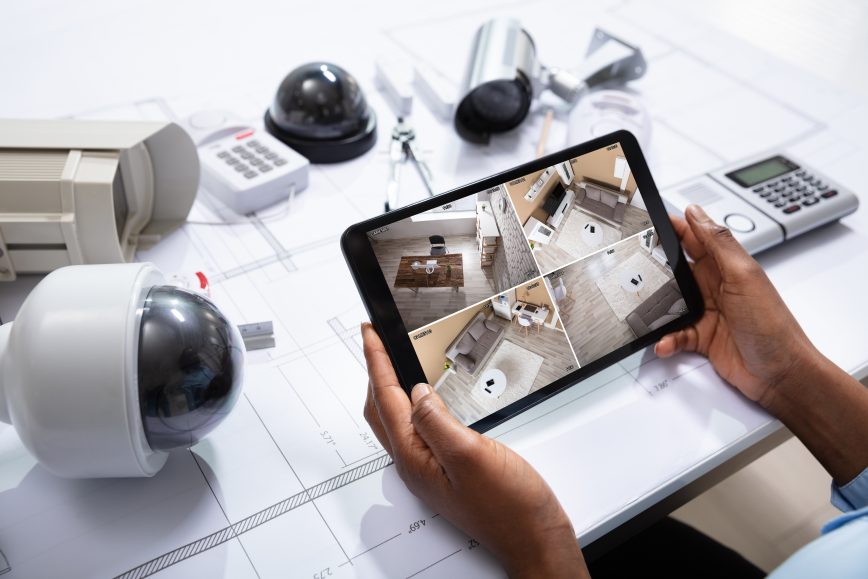A home security system is an investment, and as with any investment it’s important to determine the return you’re likely to receive.
While it can be simple to tally the up-front and monthly costs associated with a security system and alarm monitoring, attaching a price tag to peace of mind is a difficult thing to do, especially if you have children or teens in the house.
What security systems do
Security systems can do more than deter burglars. The right system can keep you linked to your home no matter where you are.
It will also let you know when doors are opened and closed and if attempts are made to access sensitive areas like gun safes and liquor cabinets. There are also other, hidden benefits that you may be able to take advantage of, such as discounts on homeowners insurance.
Cost of home security equipment
When evaluating the initial investment required to add a security system to your home, the average cost can range from $250 to more than $1,000 depending on the system, equipment and installation that you choose.
The good news is that those are one-time costs, and in most cases you will own the equipment. Once your system is installed and operational, there are monthly fees to consider.
You have a lot of control over your monthly security system cost, as packages vary significantly depending on the services, features and levels of monitoring you select. There are basic plans available from reputable companies for less than $20 per month.
However, depending on your needs and budget, there are more advanced packages that include things like live, round-the-clock monitoring or regular security patrols that can cost several hundred dollars or more per month.
How to know if the system is worth it
In order to determine if a security system is worth it for your family, start by asking yourself what would make it worth it to you. There’s no question that alarm systems deter crime and can increase the odds of catching a burglar if your home does get broken into.
According to the Electronic Security Association, if a home with a security system still falls victim to crime, the average loss is approximately $2,000 less than in a home with no protection.
If your goal is reducing loss from burglary, it’s easy to see that security systems make a difference. However, with the additional services provided by monitoring companies you could end up saving a lot more if you add monitored smoke alarms and carbon monoxide detectors, as well as remote home automation services. All of these can help prevent loss of life and property while managing energy costs.
But, just as with all types of insurance, there’s no guarantee that you’ll ever need to use an alarm monitoring service to its full extent. That’s why it’s important to fully understand your security goals in order to accurately weigh the true value of a security system and its cost.
Insurance discounts related to security systems
Typically, the more security system components you have, the deeper the discount you might be eligible for on your homeowners insurance. Not all insurance companies offer discounts for alarm monitoring and other security services, so it is important to check with your insurance company to verify the availability of any discounts.
Sometimes it’s not a matter of saving on your homeowner’s policy, but keeping it. There are some home insurance policies that will actually require the addition of a security system if a home has been burglarized or if it is located in an area with a higher incidence of home thefts.
Protect your valuables
Consider any irreplaceable items like family heirlooms, art and other pieces that carry high sentimental value for which there will be no way to recover from the loss.
To keep such items safe, you will likely need to pay something—whether you invest in a safe deposit box or a home security system.
Depending on how accessible you would like these items to be, a security system might make more sense than locking them up somewhere other than your home.
Related posts
Subscribe
* You will receive the latest news and updates on your favorite celebrities!
Related Posts
Recent Comments
- dot grid bullet journal on 2023 Election: Prophet Wale Ola Reveals Shocking Prophecies About Buhari, Atiku, And El-Rufai
- Edgar on SELF LOVE | Six Ways To Take Better Care Of Yourself
- viagra for women on BREAKING: We’ve identified those who had contact with coronavirus patient, says Larfarge
- cheap mlb jerseys from China on 2023 Election: Prophet Wale Ola Reveals Shocking Prophecies About Buhari, Atiku, And El-Rufai
- school management system on Couple names twin babies Corona and COVID
Calendar
| M | T | W | T | F | S | S |
|---|---|---|---|---|---|---|
| 1 | 2 | |||||
| 3 | 4 | 5 | 6 | 7 | 8 | 9 |
| 10 | 11 | 12 | 13 | 14 | 15 | 16 |
| 17 | 18 | 19 | 20 | 21 | 22 | 23 |
| 24 | 25 | 26 | 27 | 28 | 29 | 30 |
| 31 | ||||||

